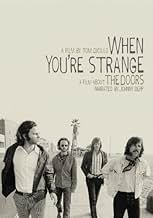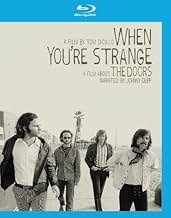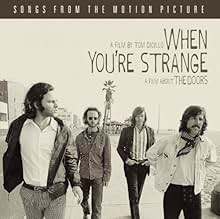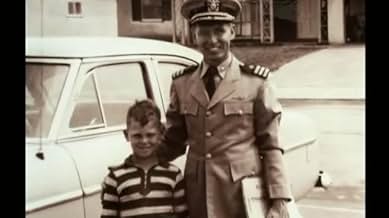VALUTAZIONE IMDb
7,6/10
10.486
LA TUA VALUTAZIONE
Aggiungi una trama nella tua linguaA look at the late '60s and early '70s rock band The Doors, including rare exclusive footage.A look at the late '60s and early '70s rock band The Doors, including rare exclusive footage.A look at the late '60s and early '70s rock band The Doors, including rare exclusive footage.
- Regia
- Sceneggiatura
- Star
- Premi
- 2 vittorie e 1 candidatura in totale
Johnny Depp
- Narrator
- (voce)
John Densmore
- Self
- (filmato d'archivio)
Robby Krieger
- Self
- (filmato d'archivio)
Ray Manzarek
- Self
- (filmato d'archivio)
Jim Morrison
- Self
- (filmato d'archivio)
Pamela Courson
- Self
- (filmato d'archivio)
- (as Pam Courson)
The Doors
- Themselves
- (filmato d'archivio)
Murray Goodman
- Self - Judge
- (filmato d'archivio)
Jimi Hendrix
- Self
- (filmato d'archivio)
Lyndon B. Johnson
- Self
- (filmato d'archivio)
- (as Lyndon Johnson)
George S. Morrison
- Self - Jim's Father
- (as Admiral George S. Morrison)
Paul A. Rothchild
- Self
- (filmato d'archivio)
Adolf Hitler
- Self
- (filmato d'archivio)
- (non citato nei titoli originali)
Janis Joplin
- Self
- (filmato d'archivio)
- (non citato nei titoli originali)
John F. Kennedy
- Self
- (filmato d'archivio)
- (non citato nei titoli originali)
Robert F. Kennedy
- Self
- (filmato d'archivio)
- (non citato nei titoli originali)
Recensioni in evidenza
As an avid Doors fan for more than 40 years, and with the vast growth of the DVD/Video market and the enormous reservoir for footage that the Internet and YouTube have, I have seen almost all there is to see of The Doors. That includes Jim Morrison's own films "A Feast of Friends" and "HWY," footage from which is contained in "When You're Strange." And most everyone has seen some things on "When You're Strange," such as the scene of The Doors descending from the stairs of an airplane on their European tour, and the bright-eyed look when Jim turns and identifies himself as "Jim."
But setting that aside, this documentary film contains considerable behind-the-scenes and archival footage that I have never seen. The tone is set early with scenes of Jim driving a car through a desert. His own home movie, Doors-like atmosphere, and dialogue. And yes, there are a lot of scenes with the group together, on the road, and interacting, as well as context shots, of locations and other things. The Miami Incident? I must confess, while some people writing about this movie say it gives you a definite answer of what happened, that is not true of this viewer; actually, I don't think anyone will ever know for sure. Still, it has a good presentation.
But the narrative, the commentary? Sorry, it leaves something to be desired. It was very superficial. To have something new and insightful for a hard core fan like myself would be challenging, but still viable. However, I believe it is accurate to say that even for casual fans who know just the basics, there are no revelations. There is certainly nothing on the songwriting process, which some of the more recently released DVDs have some discussion on. Narrator Johnny Depp's words are just the same old story.
It is time for Ray Manzarek to take it upon himself to conceptualize a film containing the very elements whose absence from the Oliver Stone film he used as a basis for criticizing it: namely, Jim's fascination with various French and other literary and theatrical figures. We know many of those names: Rimbaud, Nietzsche, Blake, Artaud, Baudelaire, beat writer Jack Kerouac, and of course Celine: "Take a Highway to the End of the Night." Fans of Jim know, from the many books about him and The Doors, that he memorized many passages of his favorite authors and would challenge visitors to his dorm room to read him the passages so he could cite the page numbers, which could make for a great scene. He was really absorbed. The film could convey how those influences shaped Jim and contributed to his writing of the great songs from The Doors powerful first two albums, The Doors and Strange Days; a few songs on later albums; and his poetry. This could be combined with other elements, including Jim's acid trips in the days when he was sleeping on the Venice rooftops and seeing "television skies." I am surprised that Director Tom DiCillo did not try to find a way to include some of this in his film, whose audience would be looking for something new.
But setting that aside, this documentary film contains considerable behind-the-scenes and archival footage that I have never seen. The tone is set early with scenes of Jim driving a car through a desert. His own home movie, Doors-like atmosphere, and dialogue. And yes, there are a lot of scenes with the group together, on the road, and interacting, as well as context shots, of locations and other things. The Miami Incident? I must confess, while some people writing about this movie say it gives you a definite answer of what happened, that is not true of this viewer; actually, I don't think anyone will ever know for sure. Still, it has a good presentation.
But the narrative, the commentary? Sorry, it leaves something to be desired. It was very superficial. To have something new and insightful for a hard core fan like myself would be challenging, but still viable. However, I believe it is accurate to say that even for casual fans who know just the basics, there are no revelations. There is certainly nothing on the songwriting process, which some of the more recently released DVDs have some discussion on. Narrator Johnny Depp's words are just the same old story.
It is time for Ray Manzarek to take it upon himself to conceptualize a film containing the very elements whose absence from the Oliver Stone film he used as a basis for criticizing it: namely, Jim's fascination with various French and other literary and theatrical figures. We know many of those names: Rimbaud, Nietzsche, Blake, Artaud, Baudelaire, beat writer Jack Kerouac, and of course Celine: "Take a Highway to the End of the Night." Fans of Jim know, from the many books about him and The Doors, that he memorized many passages of his favorite authors and would challenge visitors to his dorm room to read him the passages so he could cite the page numbers, which could make for a great scene. He was really absorbed. The film could convey how those influences shaped Jim and contributed to his writing of the great songs from The Doors powerful first two albums, The Doors and Strange Days; a few songs on later albums; and his poetry. This could be combined with other elements, including Jim's acid trips in the days when he was sleeping on the Venice rooftops and seeing "television skies." I am surprised that Director Tom DiCillo did not try to find a way to include some of this in his film, whose audience would be looking for something new.
I attended a special screening of the music documentary "When You're Strange: A Film about The Doors" at the 2009 Los Angeles Film Festival. This was my 18th screening here and the first to be completely sold out.
Writer/director Tom DiCillo was able to gain access to original footage shot from 1966-71 by Paul Ferrara, a UCLA Film School buddy of flamboyant lead singer Jim Morrison. Those old, grainy films are all that were needed to make this stunning documentary -- no modern-day or additional footage was shot.
The dramatic voice-over was provided by Johnny Depp who, in a statement from DiCillo read prior to the screening, was the one person the filmmakers felt qualified to narrate the movie. It had to be someone with a passion for the music of The Doors, and Depp fit the bill.
With the assistance of the remaining living members, particularly band co-founder and keyboardist Ray Manzarek (who sat in front of me), the film is destined to be the definitive chronicle of the band's history. We finally discover the shocking truth behind the curious myths -- did Morrison really expose his genitals at that infamous Florida concert? Did he fake his own death? "When You're Strange" separates fact from fiction and puts to rest the many rumors surrounding the manic life and untimely death of Jim Morrison. The heretofore secret details behind the making of each amazing album (one took 11 months, another took less than a week) are mind-boggling. Naturally, there's plenty of music. Tons of it.
Like all music docs, the degree to which one connects with the film is directly proportional to one's familiarity with the music and/or artists featured in the production. This certainly applies here. Like some of the thrilling music documentaries I've seen at festivals in the past couple of years ("The U.S. vs. John Lennon," "Dixie Chicks: Shut Up and Sing," "The Wrecking Crew," "Kurt Cobain About a Son"), I put "When You're Strange" right at the top of my list. I was blown away. However, while I walked away feeling that this was an absolutely brilliant film, I have to give it a qualified thumbs up if only because there is no doubt many simply won't have the emotional response that I did. But, for fans of this music, "When You're Strange" is absolutely a must-see.
Writer/director Tom DiCillo was able to gain access to original footage shot from 1966-71 by Paul Ferrara, a UCLA Film School buddy of flamboyant lead singer Jim Morrison. Those old, grainy films are all that were needed to make this stunning documentary -- no modern-day or additional footage was shot.
The dramatic voice-over was provided by Johnny Depp who, in a statement from DiCillo read prior to the screening, was the one person the filmmakers felt qualified to narrate the movie. It had to be someone with a passion for the music of The Doors, and Depp fit the bill.
With the assistance of the remaining living members, particularly band co-founder and keyboardist Ray Manzarek (who sat in front of me), the film is destined to be the definitive chronicle of the band's history. We finally discover the shocking truth behind the curious myths -- did Morrison really expose his genitals at that infamous Florida concert? Did he fake his own death? "When You're Strange" separates fact from fiction and puts to rest the many rumors surrounding the manic life and untimely death of Jim Morrison. The heretofore secret details behind the making of each amazing album (one took 11 months, another took less than a week) are mind-boggling. Naturally, there's plenty of music. Tons of it.
Like all music docs, the degree to which one connects with the film is directly proportional to one's familiarity with the music and/or artists featured in the production. This certainly applies here. Like some of the thrilling music documentaries I've seen at festivals in the past couple of years ("The U.S. vs. John Lennon," "Dixie Chicks: Shut Up and Sing," "The Wrecking Crew," "Kurt Cobain About a Son"), I put "When You're Strange" right at the top of my list. I was blown away. However, while I walked away feeling that this was an absolutely brilliant film, I have to give it a qualified thumbs up if only because there is no doubt many simply won't have the emotional response that I did. But, for fans of this music, "When You're Strange" is absolutely a must-see.
10rtcblc
I was able to see this at Sundance this morning. What an outstanding film!! By weaving original footage from many sources including takes from a movie Jim Morrison made himself Mr. DiCillo presents an intimate view of all the DOORS in the context of the 60's and early 70's. An intimate look at the complex relationships between Morrison and the other members and hugely entertaining. DiCillo spoke at the end of the movie and during the Q&A's he mentioned one critic accused him of "recreating" footage in the film. The supposed recreated footage was actually Morrisons own film starring himself. This rumor is extremely frustrating to DiCillo as it is spreading via the internet. See for yourself, this is a excellent movie. I asked DiCillo if he had cooperation from Morrison's family. He said he had a lot of help from Morrisons family especially on the relationship between Jim and his father. I hope someone picks it up for distribution. I'd go again.
After seeing Oliver Stone's version several times over the years, I was, at first, not sure this would interest me. It did very much interest me. I was born in 1960 and I grew up in this era. I had the doors albums, but did not ever see them live. I felt this doc had fresh information; especially rare footage and the bands musical background and how they improvised and contributed to the songs and concerts. If you do not know things about Jim, you do not understand his drives to the dessert and his witnessing things die, and what that death meant to him and how fascinated he was and he wrote about it. For those who say there was not music, you are all out of your minds. There was non-stop music. Really? Would be nice to hear an interview? Frankly, as a psychologist and documentarian, none of the interviews would be very valuable, as the press are morons and ask the most inane questions that infuriate me and the musicians. So instead maybe more of his poetry. But I believe they did the best they could with the footage they had, real footage; which I greatly appreciated. I think if you are curious or a fan, this is a must see.
Having been a fan for over 20 years, I'm fairly jaded when it comes to bios on the Doors. The new footage and DiCillo's narrative structure offer a truly fresh look at the subject matter, since it's the first time I've really felt I've had an insider's view on the band. Morrison is treated like a real human being, stripped of all the legend and bombast. Instead of the pretentious rock star, you get to see Jim the person evolving over time, with all the joy and suffering that he experienced. There's a shot of him exiting the courtroom in Miami with a look of vulnerability that I found shocking, as it's at odds with image of the cool, cocky singer. The history of the band is subtly told though a wash of images and sparse narration which touch all the milestones without feeling like another retread. It definitely deserves another viewing, consider me a confirmed buyer of the DVD.
Lo sapevi?
- QuizFor the first time in the band's history unprecedented access was granted, regarding the previously unseen footage of Jim Morrison.
- BlooperA mock newspaper clipping announces both that Sharon Tate and her friends have been found murdered and that Charles Manson and his "Family" are suspected. Manson and the "Family" were not identified as the Tate killers until December 1969, more than four months after the murders happened.
- Citazioni
Jim Morrison: The music can't help but reflecting things that are happening around you
- ConnessioniEdited from Feast of Friends (1969)
I più visti
Accedi per valutare e creare un elenco di titoli salvati per ottenere consigli personalizzati
- How long is When You're Strange?Powered by Alexa
Dettagli
- Data di uscita
- Paese di origine
- Sito ufficiale
- Lingua
- Celebre anche come
- The Doors. When you're strange
- Vedi altri crediti dell’azienda su IMDbPro
Botteghino
- Lordo Stati Uniti e Canada
- 246.078 USD
- Fine settimana di apertura Stati Uniti e Canada
- 66.833 USD
- 11 apr 2010
- Lordo in tutto il mondo
- 1.194.182 USD
- Tempo di esecuzione1 ora 26 minuti
- Colore
- Mix di suoni
- Proporzioni
- 1.85 : 1
Contribuisci a questa pagina
Suggerisci una modifica o aggiungi i contenuti mancanti

Divario superiore
By what name was When You're Strange (2009) officially released in India in English?
Rispondi
































